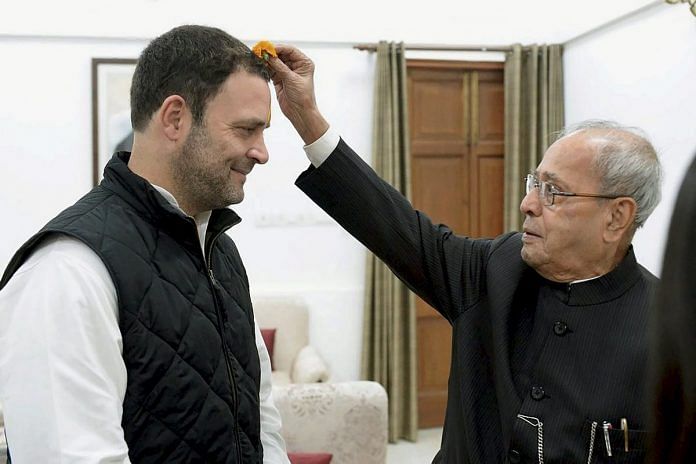Former President Pranab Mukherjee in 2010 is believed to have drafted the party’s resolution that said the ideology of the BJP and RSS ‘threatens the very basis of secularism’.
New Delhi: The man said to be behind a Congress resolution accusing the RSS of being a threat to India’s unity will take the stage Thursday as the chief guest at an event of the Sangh in Nagpur.
Former President Pranab Mukherjee is set to address future pracharaks at the valedictory function of the Sangh Shiksha Varg, a training camp for RSS volunteers — a decision that has shocked and horrified his party colleagues in the Congress, including daughter Sharmistha Mukherjee.
The resolution in question was drafted in 2010, and presented during the Congress’ 83rd plenary in Delhi. The accusations against the RSS had got the session wide media coverage.
“Usually it was Mukherjee who would draft political resolutions for AICC sessions, and that one (2010) was drafted under his guidance too,” said a senior Congress leader who attended the session.
A Congress leader suggested that Mukherjee, then a senior leader of the party, had gone through the resolution very carefully and even proposed some changes before finalising it.
What the resolution says
“The very basis of secularism is threatened by the ideology of the BJP and its affiliate organisations (sic) like the RSS, which spreads hatred and violence,” the political resolution said, “The RSS and VHP are insidious in their efforts to break India.”
In subsequent paragraphs, the resolution urged the then UPA government to investigate links between the “RSS and terrorists who are posing a threat to the nation’s security”.
“The role of religious fundamentalist organisations in challenging the security of the nation can no longer be ignored,” the resolution said, “The Congress calls upon the government to tackle this menace in the strongest possible manner and investigate links between terrorists and the RSS and its sister organisations that have been uncovered in recent cases.”
“Terrorism from wherever it comes and whatever form it takes must be dealt with firmly,” the resolution said.
An indirect attack was also made at then Gujarat chief minister Narendra Modi, who was then at least three years away from being officially declared the BJP’s prime ministerial candidate for 2014.
“The BJP, the RSS and the VHP continue to hide their prejudice, and the atrocities committed by them, behind the rhetoric of economic progress and pseudo-nationalism,” it said. “We cannot be indifferent to the plight of our fellow citizens in Gujarat who have suffered untold misery. The Congress urges the government to relentlessly prosecute all those responsible for the unforgivable genocide that occurred in large parts of Gujarat in 2002.”
The reference was to the post-Godhra riots, one of Independent India’s bloodiest episodes that led to the deaths of more than 1,000 people.
The backstory
A major controversy had erupted three days before the plenary, with a Wikileaks release quoting then Congress general secretary Rahul Gandhi telling the US ambassador in 2009 that Hindu extremists may pose a bigger threat to India than Muslim terrorists.
The conversation between Gandhi, then still a newcomer in politics, and Timothy Roemer had triggered a massive row over the fact that a matter of internal security was discussed with a foreigner, besides the nature of the allegation itself.
It was in this light — amid a BJP-led onslaught against Gandhi over the statement — that the Congress’ plenary kicked off on 19 December, 2010.
Mukherjee was part of the committee that drafted the party’s political resolution for the session. Since Gandhi had already set the tone with his remarks on Hindu extremism, the party pegged the resolution on the criticism of the RSS and the BJP to back their heir-apparent’s claim.






